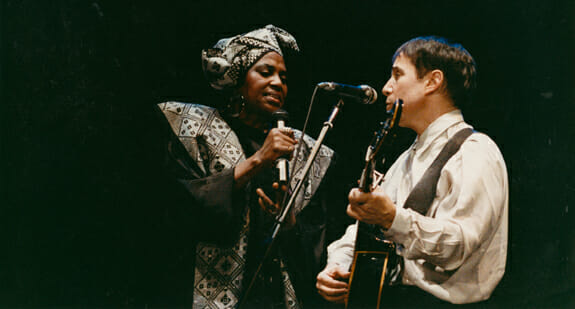Under African Skies

Director Joe Berlinger’s fascinating, immersive documentary Under African Skies celebrates the 25th anniversary of Paul Simon’s landmark Graceland album and also examines the firestorm of controversy that it ignited.
In 1985, Paul Simon traveled to Johannesburg, South Africa, to meet and record with the black South African musicians who had become a kind of inspirational obsession for him. Nine days in South Africa and subsequent sessions in New York and London culminated in the five times Platinum, Grammy-winning cultural touchstone Graceland. While the album’s musical excellence was nearly universally praised, Simon’s methods were found to be suspect. Although his trip to Johannesburg was approved by the black musicians’ union, the South African Musicians Alliance, it was not under the auspices of the African National Congress and, most notoriously, it violated the United Nations’ cultural boycott against South Africa’s vicious apartheid system of racial segregation and brutal white dominance.
At the time of Graceland’s release, this exacerbated other accusations that Simon’s pastiche of South African music with his own melodies might be more a case of cultural imperialism than of collaboration. Although Simon gave the other musicians songwriting credit and paid them three times union scale, there is some gray area as to the line between collage and co-opting in his use of existing melodies and grooves to fit his own lyrics and ideas.
Berlinger has already demonstrated his ability to dig to the root of an issue and his refusal to shy away from controversy in previous work, including his West Memphis Three Paradise Lost documentaries and his excellent rock doc Metallica: Some Kind of Monster. And he shines here, simultaneously celebrating Simon and his collaborators’ musical excellence while presenting arguments both defending and damning. Simon’s longtime friend Harry Belafonte conveys his love for Simon and his record along with his disappointment that Simon ignored his advice and skirted the ANC in his journey to South Africa. Philip Glass and Paul McCartney defend the purity of the art while activist and longtime Simon critic Dali Tambo still expresses frustration over his ignoring of the boycott.
-

-

-

-

-

-

-

-

-

-

-

-

-

-

-

-

-

-

-

-

-

-

-

-

-

-

-

-

-

-

-

-

-

-

-

-

-

-

-

-








































